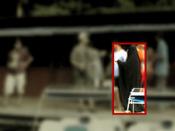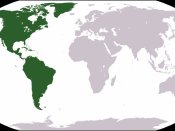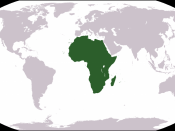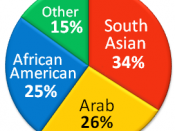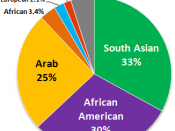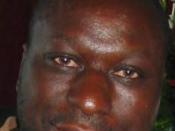Growing up with both West African and Muslim background, Sylviane A. Diouf decided to research and inform the world that there were Muslims involved in the slave trade. Diouf was so confident that these stories existed that she started her research along the pan-Africanist as well as the pan-Amercanist lines.
After her research she decided to write a book about what she had discovered entitled Servants of Allah. Diouf says her objective was to "humanize" the individual Africans who were enslaved and detach them from the mass of what we call slaves.
During her research Diouf says that she found there was a slight difference between the British, Dutch, Spanish, French, and the United States slave systems. She also discovered there were some cultural differences between the Mandingo, Fulani, and Hausa. In matters of religion, formal education, and found out that in many ways that as Islam transpires in daily life, they all shared a similar set of attitudes and beliefs.
Diouf received her Doctoral from L'Universite' Denis Diderot in Paris. She has published hundred's of articles in both the International and local magazines and newspapers. One of her textbook is now apart of the 11th grade curriculum (Economic Sciences), in France. Diouf has written for the United Nations and contributed to numerous academic journals such as; Black Renaissance/Renaissance Noire, a bilingual journal of the African Studies Department of New York and the Journal of Islamic Studies of Oxford University. She has been fortunate enough to teach in France and Gabon. Her homes throughout the years have been Senegal, France, Gabon, Italy, and New York (which she now resides).
The book Servants of Allah takes the audience back and forth between West Africa and the Americas in piecing together a history of African Muslims for over four centuries. When reading the book Servants of Allah we realize that it consisted of a detailed reconstruction of the Muslim slave efforts in the United States in order to maintain an Islamic way of life.
Many Muslims refused to convert to Christianity. Instead they kept their Muslim names, dietary restrictions, sexual taboos, appearance (wearing bands, turbans, and even veils) in order to keep them apart from the non-Muslims.
Naturally the Muslims were not at ease with their slavery. Diouf explained that being Muslim helped to perform better in horrifying or difficult circumstances while in America. She stated that Muslims rose to the top of the slavery hierarchy and were returned to Africa more frequently.
Many fail to realize that Muslims had a large role in establishing maroon communities and leading slave rebellions, dominating their planning and leadership. While in communal solidarity the Muslims decided to use their knowledge of Arabic at time in order to serve as common and secret languages for planning revolts.
In 1503 request were being sent from Dominican Republic to Spain to ban the import of Muslim slaves to the "New World". They still refused to obey the rule and continued to bring those (Muslims) over. This resulted in a 1522 revolt in Hispaniola. Other revolts included: Mexico (1523), Cuba (1529), Panama, Venezuela, and Peru (16th Century), Guatemala (1627), Chile (1647), Florida (1830-1840), and Brazil Bahia (1835). Most were unsuccessful regarding freedom- which caused the freedom fighters to become ruthlesslessly crushed, hanged, burned and even thrown in boiling oil.
Despite all of this the Muslims still banned together. Diouf says much of their success resulted from their sense of community and solidarity. Some came from their resistance to being dominated more than necessary by their Christian overlords; while the rest came from their education. Diouf pointed out that "literacy became one of the most distinguishing marks of the Muslims." She also stated that the literacy rate among Muslim slaves were probably higher than their masters.
When the last Muslims of slave background died in the 1920's they (the Muslims) never let the truth be forgotten. The legacy of Muslim slaves is still controversial. Many still believe that African slaves were Muslims. This is causing many to reverting to their original faith and not a new one. In other words Christianity was enforced upon slaves in America, it was not a faith that they truly accepted.
Upon completion of her book Diouf traced the common habit of black American males of wearing handkerchiefs, rags, and bandannas around their heads back to the times when Muslim slave ancestors always (and still do) wore a turban or skullcap. This goes to show you that regardless of what we were taught there are still some things we should know and never forget.
All in all this was an excellent book with sufficient information to support it. I thought that it brought both knowledge and understanding to me as a reader as well as an African American. I did however encounter some problems when names were being mentioned (some with the meaning while the others were without). I think the author did an excellent job researching and putting together a book that many can relate to.
What we fail to realize that these people were doctors, pharmacist, lawyers, architectures, mothers, fathers, sons, and daughters. They were taken away from the only home they know.
Remember "The African Muslims may have been, in the Americas, the slaves of Christian masters, but their minds were Servants of Allah"
